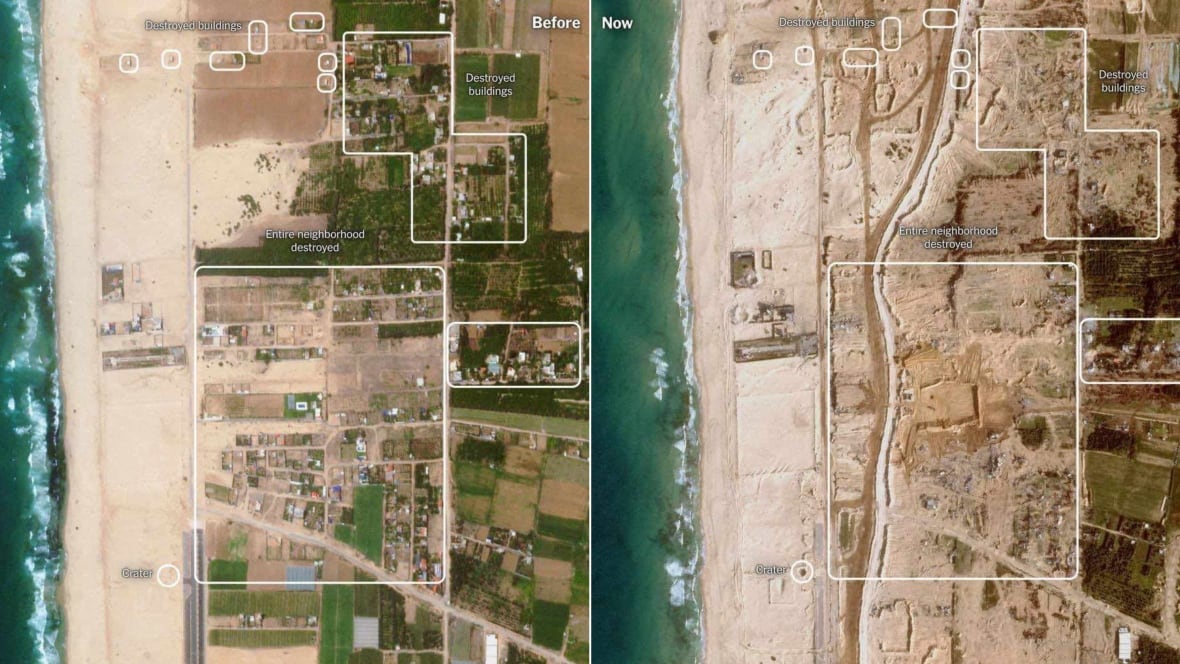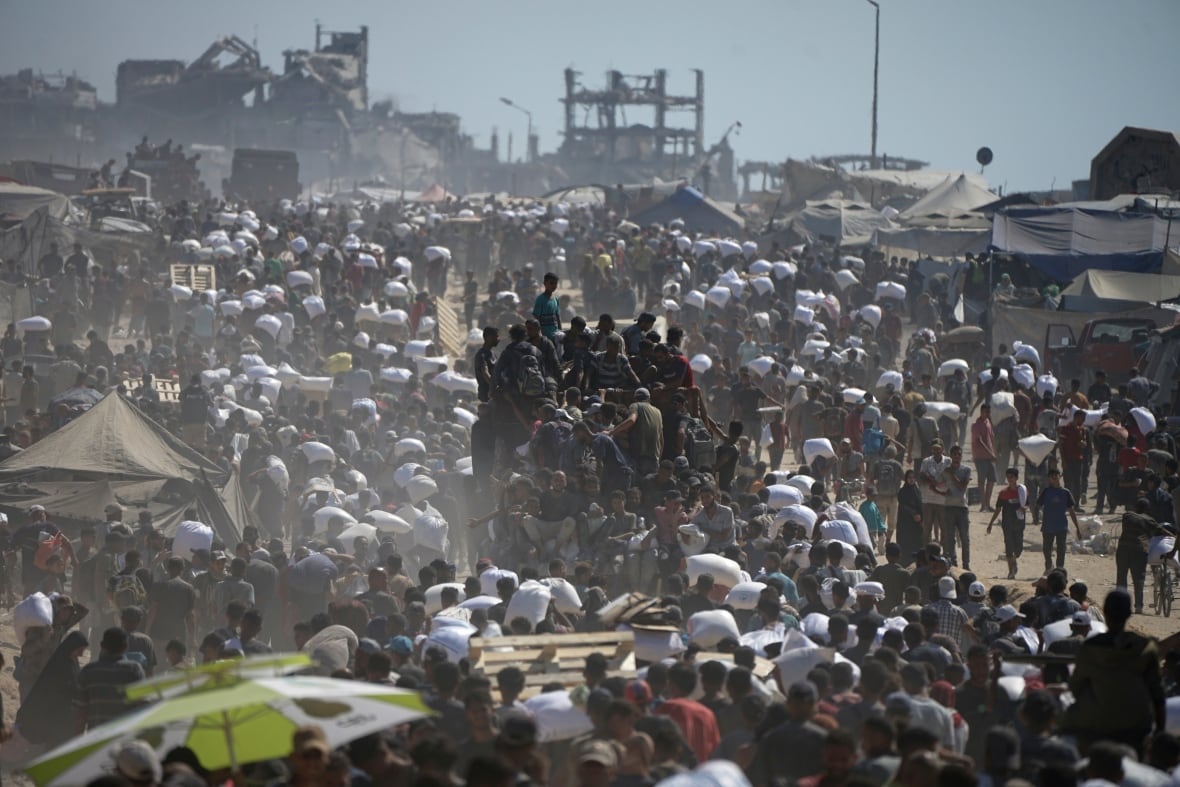In the days after Oct. 7, 2023, journalist Fares Alghoul packed his suitcase, expecting to imminently leave his Hamilton home for Gaza to cover the war from the ground.
That’s how he’d covered Israel-Hamas wars and conflicts in Gaza in the past, as a chief correspondent for The Associated Press.
But this time was different. He no longer lived in the Palestinian territory and foreign media were not allowed to enter, a rule that hasn’t changed nearly two years later.
Alghoul, 42, has not given up on returning, but in the meantime, he’s settled for reporting on the war as a freelancer from halfway around the world.
“I am dreaming of the day I can go back,” he said. “I am emotionally attached to Gaza. I love Gaza.”
Born in Gaza, Alghoul is a permanent resident of Canada. His work means that although he, his wife and four children, including 11-month-old twin boys, are not experiencing the fear and hunger first hand, he’s still following the impacts hour by hour, day by day.
“I keep watching the news, looking at the scale of destruction and realizing Gaza will never be the Gaza we knew,” Alghoul said. “We cannot stop saying how bad the situation is, how horrible it is in Gaza.”
Multiple media outlets in Israel have reported that Israeli Prime Minister Benjamin Netanyahu wants a complete military takeover of Gaza, while almost 600 former Israeli military and security officials are petitioning Washington to stop the fighting.
The most recent conflict began with a Hamas-led attack on Israel that killed about 1,200 Israelis and led to about 250 people being taken hostage in Gaza, according to Israeli tallies.
Israel’s subsequent, 22-month military offensive has left more than 61,000 Palestinians — mostly civilians — dead and wounded more than 140,000, according to Gaza’s Health Ministry.
Journalists ‘front-line witnesses’
Palestinians are also experiencing widespread hunger, malnutrition and disease, according to over 100 international aid organizations that released a call for action in July. The statement was signed by organizations including Mercy Corps, the Norwegian Refugee Council and Refugees International.
The World Food Program reports 500,000 people are enduring famine-like conditions. As of Tuesday, some 188 Palestinians, including 94 children, have died from hunger since the war began, according to Gaza authorities.
Local journalists who have stayed in Gaza to document the impacts of the war also can’t find clean water or enough food, the Committee to Protect Journalists, a non-profit that promotes global press freedom, said last month.
“Israel is starving Gazan journalists into silence,” said regional director Sara Qudah in a statement July 23. “They are not just reporters — they are front-line witnesses, abandoned as international media were pulled out and denied entry.”
Looking at a photo taken five years ago of about a dozen men sitting around a table smiling, Alghoul recounts what’s happened to each of his friends and fellow journalists since.
Two were killed in the war, a couple are reporting as he is from other countries and others remain in Gaza, but are struggling to feed themselves and their families, he said.
“Because they are journalists and still working, they can afford to buy food, but it’s getting harder day by day,” he said. “The crisis is hitting everybody.”
A farm oasis
Like many Palestinians in Gaza, Alghoul’s life is shaped by wars.
His eldest daughter, Somaya, was born during the First Gaza War in 2008-2009. When his wife went into labour, she had to go to the hospital as bombs fell, Alghoul said.
His father was killed in that war, at their farm in northern Gaza, near the border with Israel, he said.
The farmhouse was also destroyed, but he, his mother and other family members rebuilt it.
“Our farm was like our escape from the concrete jungle of Gaza,” said Alghoul.
The farmhouse was bombed again in the 2014 war and his family rebuilt, again. It was bombed a third time, in 2021 fighting, but his family didn’t give up hope and built it bigger and better than before, out of concrete and with three bedrooms and two bathrooms, he said.
They replaced old citrus trees with new ones and spent some of the COVID-19 pandemic there, eating homegrown strawberries and melons, making their own bread and drinking fresh milk from their cows, Alghoul said.
By then, his wife and two daughters had moved to Canada while he continued to report from Gaza.
“I was the expert because I have the connections, the contacts, the language, the culture — everything,” he said.
In May 2021, the Israeli military bombed The Associated Press’s office where Alghoul worked, claiming Hamas was operating there. No one was injured, as they’d received a warning and evacuated shortly before, but the attack was condemned by press freedom groups that said it was a form of censorship.
Alghoul joined his family in Canada soon after, going back to Gaza every few months to continue reporting.
The last time he was there was in August 2023, on a family trip with his wife and daughters. They noticed a change in their homeland as Israel had eased some of its restrictions in Gaza, allowing people and goods to move more freely, Alghoul said.
“Gaza was recovering and reviving,” he said. “It had become more beautiful, the food was getting nicer. The atmosphere was real, genuine, unique — that’s what I love about Gaza.”
Somaya saw a difference, too.
“It was really nice,” she said. “There was more life than before. I wanted to stay there.”
Grandmother remains in Gaza
Weeks later, Hamas attacked Israel and the war began. Early on, his family’s farmhouse and surrounding land were destroyed in Israeli attacks, Alghoul said.
He said his family has not been able to access the area since as it is occupied by the Israeli military. Satellite images show the usually green landscape is now a sandy brown.

They have no plans to rebuild their farmhouse and have mostly all left Gaza for safer countries like Egypt, he said.
His grandmother, uncle and cousins remain in Gaza City, where life is difficult and perilous, he said.
“They try to take care of her as much as they can,” Alghoul said. “My cousins risk their lives many times going to the aid distribution sites and truck routes to get whatever they could.”
He doesn’t know how Gaza will recover or rebuild, even when the war ends.

How can it, he said, “when people who have their own lives, their own homes have turned into people running to get food, exposing themselves to death and danger in order to feed their children?”
Several hundred Palestinians have been killed by Israeli fire since May while heading toward food distribution sites and aid convoys, according to witnesses, local health officials and the United Nations human rights office. The military says it has only fired warning shots and disputes the toll.
While Alghoul plans to report from the ground as soon as he’s allowed in, he said he’s thankful he, his wife and children are now living in Canada.
“I know how horrible it is in Gaza. But I don’t dare imagine my kids in that situation. I don’t even dare.”
www.cbc.ca (Article Sourced Website)
#Covering #war #Gaza #Canada #Palestinian #journalist #yearns #report #place #loves #CBC #News
